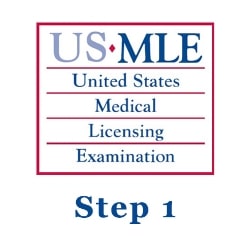When should I start really to think about Step 1?
Summary:
Step 1 does indeed hold quite a bit of importance. Not only do you have to pass it in order to become a doctor, but it also is extremely important in the residency application process… Your score on Step 1 could determine whether or not you get an interview for some residency programs. You need to have a studying program that works for you, and start reviewing material for Step 1 early on. You need to have a study plan for Step 1 at least six months before you take the test. Be willing to change your study habits if what you have been doing is not working. The most critical time for high-intensity test preparation for Step 1 is the 4-6 weeks before you take the exam. With focus and intense preparation, you will make it through the dreaded Step 1 exam just like countless medical students before you have.

The importance and unimportance of Step 1…
The intent of the USMLE Step 1 is to assess whether students can “apply important concepts of the science basic to the practice of medicine.” If you talk to any physician who has been in practice for a while, you realize that students didn’t always place the high level of importance to the test that they do now… Over the years, the test has gotten better at linking basic science concepts to clinical application. At the same time, residency program directors that are inundated with applications are using the test as a screening tool for deciding whom to interview.
Is the test important? Yes, in the sense that you MUST pass it in order to become a doctor. It’s also important because it assesses your grasp of the basic sciences applied to clinical practice. Last, but not least, it’s important because it helps you in the residency application process. If we were honest with ourselves, it is the last reason, residency application, which is the main driver for the focus on Step 1 performance… However, is all that attention warranted?
For many students, performance on Step 1 is an all-consuming compulsion. Students focus on Step 1 while ignoring many aspects of their professional development. They become so obsessed with studying for Step 1 that they don’t meaningfully engage in other activities (e.g. student leadership, clinical shadowing, professional networking, etc.). From the aspect of residency applications, while it is important to have a score which puts you in a competitive position, it is detrimental to solely focus on Step 1 while neglecting other aspects of your professional development which creates a well-rounded and attractive candidate for residency.
Start early but don’t get carried away in the beginning…
Medical school is a marathon, not a sprint. However, it’s a marathon with a number of hills that all lead to an eventual summit. The beginning of medical school is defined by the major adjustments made in studying strategy, lifestyle adaptation, and figuring out how best to budget your time. One thing you will never have enough of is time, and you need to plan accordingly. However, the Step 1 exam is the last thing you should be worrying about as you transition into your medical school journey.
What you should be conscious of is that everything you are learning BUILDS on previous information, and in the end you are responsible for EVERYTHING you are taught in a way that far exceeds any learning experience you’ve had to endure prior to medical school (yes, especially the MCAT). The earlier you appreciate this fact, the sooner you will be able to figure out what strategy works best for YOUR long-term retention. Whether you’re a flash card learner, a study guide maker, or an avid textbook reader, it is prudent to learn information and keep it accessible so that you can refer back to it in an upcoming unit, OR when you are ready to sit down and study for the Step 1 exam.

By six months prior – have a study plan…
There is no “one size fits all” plan for medical students when it comes to getting an early start on Step 1 preparation. What you will likely find in your medical school class is a vast array of review strategies, mostly depending on how much time students are willing to give to old material while trying to learn new, voluminous curricular material. The same approach will not work for everyone, but you must make sure that your approach works for you. This is no doubt a juggling act, and one you must be purposeful with if you are to stay on top of the current curriculum AND keep your eye on Step 1 at the end of your preclinical years.
One of the best pieces of advice I received from an upperclassman in medical school was that whenever you are given an opportunity to review something you have already learned, take it. For example, if you are learning about dilated cardiomyopathy and that Coxsackie B is a common viral etiology, if you’ve already learned micro/immune go back and review what Coxsackie B looks like, what group of viruses it belongs to, etc. This gives you a clear opportunity to dig up old material in a constructive and relevant way. This is a perfect example of both the fact that the knowledge you gain in medical school builds on itself, and that the curriculum is meant to bring seemingly disparate topics together. Eventually this stuff will start to make sense!
Another way you can hold yourself accountable is to use question banks (such as Kaplan, Rx, etc.) to test your knowledge of old material. You can do this if you think you remember the material well, or also if you’re simply trying to gauge which information is the weakest in your memory. The earlier you identify your weak spots and address them in a direct way, the better off you’ll be when you get to dedicated study time.
Above all else, in this 5-6 month period before dedicated study time for Step 1, you must be amenable. Studying habits you stuck to throughout the curriculum may carry you through to board prep, but do not be afraid to make changes to your habits if certain thing aren’t working. Those who perform really well tend to respond early to setbacks and make crucial changes when they know that they are not performing at their best. Don’t be afraid to change your methods if you’re not receiving the results you expected.
Using dedicated study period wisely…
This period (4-6 weeks) right before Step 1 is the most critical time for high-intensity test preparation. Your school should be aware of this critical period and allot time for you to spend studying for Step 1 once the curriculum has been completed. We don’t want to inundate you with study plans for your dedicated study time, but here is a good example of a pre-made, two-week schedule: sample_step_1_schedule. By the time you sit down for dedicated study time, you should know which resources you will be using and how exactly you’ll be incorporating them into your daily study schedule. Videos, notes, questions, and practice tests should all be used synchronously to help review, build, and solidify your knowledge base each week. Like everything in medical school, though it may seem daunting at first, if you plan ahead and approach it with purpose, you will come out successful and will have learned more about yourself in the process. Remember, just because a task is daunting doesn’t mean you shouldn’t go ahead and take the first step! You CAN do this with some preparation, effort, and introspection.
Resources:
Previous Pain Point: How much time should I devote to current material versus previous material?
Next Pain Point: How do I interact with other students during this time?